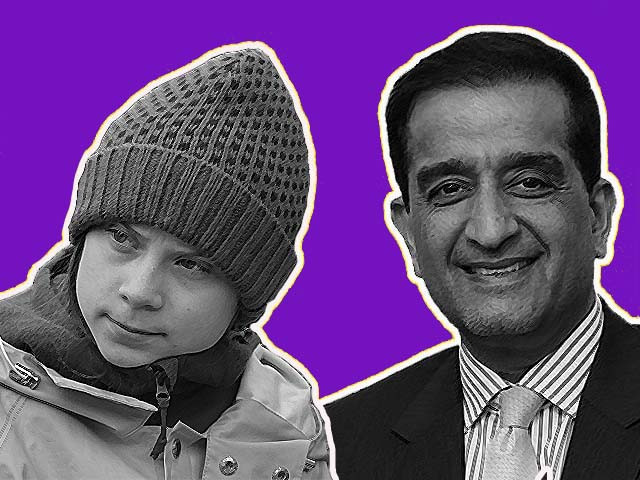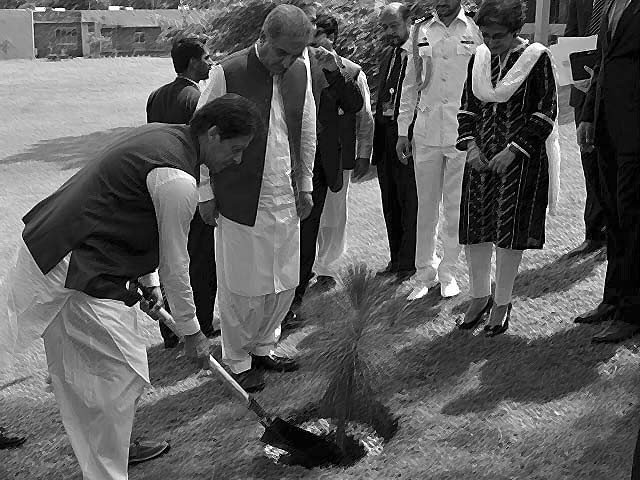
A man wearing a face mask sits in front of a shuttered market during a government-imposed nationwide lockdown. PHOTO: AFP
Covid-19 in Pakistan – separating fact from fear
Dr Faisal Sultan advocates the setting up of a permanent Centre for Disease Control in Pakistan
Although Pakistan’s first coronavirus cases were detected on February 26th, it is now clear that our slow trajectory has not followed that of the United States or Europe, but there is still a lot of uncertainty. One doesn’t know what to believe since we are constantly bombarded by information while glued to our smartphones and television sets during the lockdown. Are we not testing enough people? Are the confirmed cases (8,418 to date) just the tip of the iceberg? And is the number of deaths (176 in total so far) being under-reported? Is Covid-19 going to go away in the hot, summer months or is it going to continue to spread across our cities sending thousands into hospitals?
Amidst all this fear and confusion, I got the chance on Friday to interview Dr Faisal Sultan, CEO of Shaukat Khanum Memorial Hospital, who specialised in infectious diseases in the US after graduating from King Edward Medical College. Last month, he was appointed Prime Minister Imran Khan’s focal person on efforts to curtail the Covid-19 outbreak in Pakistan. Dr Faisal also sits at the National Command and Control Centre that was set up last month to ensure effective coordination amongst the federal and provincial governments and meets daily. He also sits in on the weekly National Coordination Committee meetings that look at overall strategy.
Dr Faisal is being supported by Tania Aidrus, the special assistant to the prime minister on Digital Pakistan. Tania has been using data to map the trajectory of the outbreak and tweeted last week graphs showing the comparison of global Covid-19 growth trend with indications of when restrictions were imposed. She concluded that,
“Confirmed cases in Pakistan are doubling roughly every two weeks”.
 Photo: Twitter/Tania Aidrus
Photo: Twitter/Tania Aidrus Photo: Twitter/Tania Aidrus
Photo: Twitter/Tania AidrusDr Faisal is also being supported by the Strategic Reform Unit, which is housed in the prime minister’s office. According to Kashmala Kakakhel, who is a member of this unit,
“In comparison to other countries, say the US where on an average, the cases have doubled every five to seven days, and in some countries of Europe even faster than that, Pakistan is in relatively better shape at the moment”.
Mathematical models were used to predict the trajectory of the epidemic in Pakistan (how fast it was going to spread based on rate of infection etc.) and they were compared with real data once it started to come in (both confirmed cases and number of deaths) from all districts of Pakistan through the Ministry of Health, explains Dr Faisal. The comparison proved to be heartening. For example, the model predicted 4000 plus cases in Pakistan by April 4th, but according to real data only 2,824 confirmed cases were reported on that date. Pakistan, he says, moved relatively fast in imposing restrictions as compared to many other countries. He told me,
“We found a clear impact… There was a slowing down of the trajectory which coincided with the March 24th restrictions”.
In his opinion, the curve began to flatten once the lockdowns across the country had been put in place. But were enough people being tested?
“Initially, we used the testing kits judiciously – we tested only those who showed symptoms and their relatives/associates, those at higher risk”, Dr Faisal states.
In the last few days, he says, testing has increased so number of infections detected is going up,
“We have now doubled the number of tests. So if one person is positive how many have been infected if it is a 1:10 ratio?”
They are using technology to identify the suspected cases using NADRA and other databases. A pilot for contact tracing has proven to be successful and is now being implemented on a larger scale.
The main figure to look out for now, he says, is the number of deaths from Covid-19,
“We are working backwards from the deaths. Most deaths are reported. Each death could mean 100 possible infections from 18 days earlier”.
His team is now focusing on the accurate tracking of death rates and the number of people on ventilators across the country (45 so far). He says that while deaths have risen in the last few days, most of the dead (over 80%) were above 50 years old and of those most had other illnesses. So far Pakistan has only reported 176 deaths in a population of over 200 million. What about all the dead on arrivals in Karachi that some news reports are claiming? Dr Faisal is skeptical but says the Ministry of Heath is looking into it to be able to assign a reasonable cause of death, stating,
“So far our health capacity has not been overwhelmed”.
What about the slackening of the lockdowns and allowing people out on the streets again?
“Short of a curfew this is the best we can do in the country, if an across the board action is to be done. The efficacy was around 60%”, he tells me.
Future, targeted, “smart” restrictions could be used. In the mean time, flights have been grounded and our borders sealed so now we are dealing with local transmissions (58% of the cases now). What about the start of summer, will that slow down transmission of the coronavirus?
“Indeed there is a possibility that warmer weather may slow the trajectory,” says Dr Faisal. “Another 2-3 weeks will reveal the story clearly”.
He says he is “more comfortable today” than he was during the first few weeks of the outbreak.
“Something is going right, but this is too early to relax or lower the guard,” he says, and only further research will pinpoint the exact reasons.
Is the strain in Pakistan somehow weaker than the one in Europe or US? According to Dr Faisal,
“Viruses do mutate. There are already different strains of the coronavirus around the world. Does that translate into less virulence? It is possible… More research is needed”.
As for life with coronavirus, he says that we have to practice social distancing and keep washing our hands and avoid crowded places until a vaccine is found, which could take a year or two. Older people in particular have to be very careful to isolate themselves. In the mean time, “the virus could become less virulent or we could find an effective treatment for it”.
His team will continue to monitor the number of cases reported by the Ministry of Health and will recommend “if and when to tighten and loosen restrictions. There is a need for targeted restrictions. We are hoping we can narrow down the hotspots”. Given their population density, many cities and towns will emerge as hotspots. Right now, the limited flights into the country are being monitored and passengers tested and quarantined. In future these efforts will need to be scaled up if regular flights are to resume.
For now, he says,
“We have to slow down the spread of the virus and ensure our healthcare system is not overwhelmed”.
Our real data shows that Pakistan is in a much better position than initial projections. But Dr Fasial warns,
“We have to get used to the new normal. We can’t go back to the way things were. We have to continue our lives in novel, different ways”.
He advocates the setting up of a permanent Centre for Disease Control in Pakistan to deal with the coronavirus outbreak and any future pandemic because,
“Epidemics don’t respect boundaries – we need a centralised system to control them”.




COMMENTS
Comments are moderated and generally will be posted if they are on-topic and not abusive.
For more information, please see our Comments FAQ